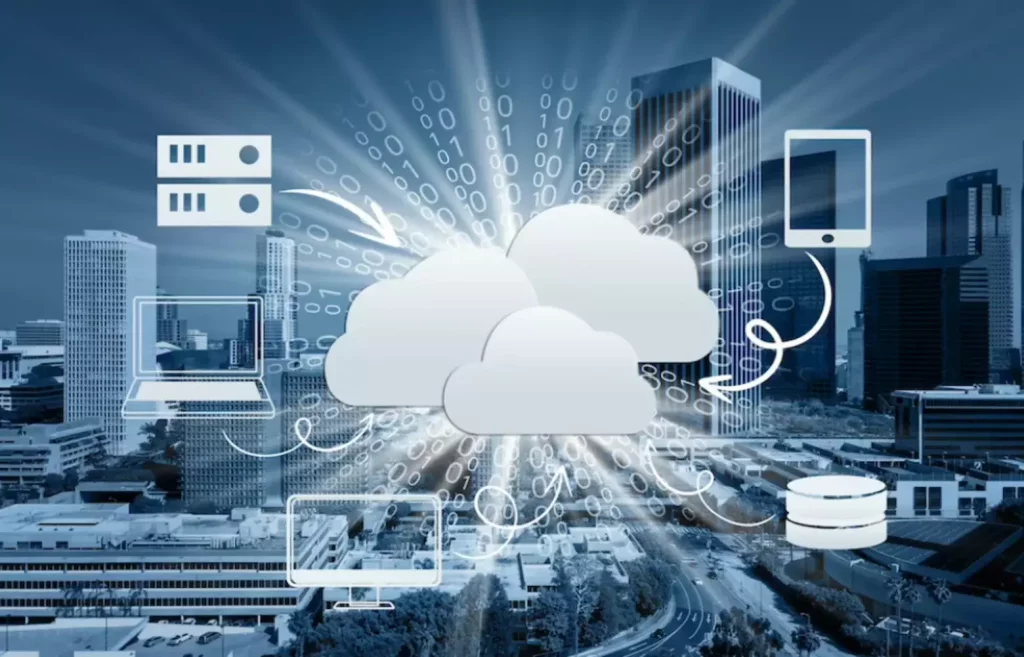Cloud computing has become an outstanding way to provide IT [Information Technology] infrastructure to all customers. It’s not a group of products that get implemented.
There are several types of cloud computing, such as public and private cloud and hybrid cloud. Out of the three, the public and private clouds are more popular.
In this post by Hero Vired, we will provide a detailed explanation of the public and private cloud, their differences, and many other things.
Let’s get started!
What is Cloud?

Cloud is known as the “network” or the “internet”. It’s a technology that utilizes the remote servers present on the internet to access, manage, and store data only instead of the local drives.
This “DATA” can be all types of things, such as video, audio, documents, pictures, files, etc. People also utilize the IaaS PaaS SaaS, which is cloud-hosted servers. Besides that, through cloud computing, you can conduct the following tasks:
- Stream audio and videos
- Develop new services and applications
- Recover, backup and store data
- Host websites and blogs
- Deliver software on demand

POSTGRADUATE PROGRAM IN
Multi Cloud Architecture & DevOps
Master cloud architecture, DevOps practices, and automation to build scalable, resilient systems.
Importance of Cloud
Before the cloud existed, all businesses stored their software and data on servers and hard drives. Bigger companies require bigger storage space. This method of treating data cannot be done quickly.
For instance: When people get to know about your business, and you receive a massive amount of orders online, the servers will crash.
This clearly shows that cloud computing is vital for all businesses to operate smoothly online. But wait! Businesses are not the only ones who benefit greatly from the cloud.
This technology also plays an important part in the lives of people across the globe. If you observe closely, you’ll find that cloud services are utilized by everyone regularly. Some of these examples are
- Updating social media
- Watching new series
- Check the balance in the bank
Experts of DevOps & Cloud Engineering have also pointed out that people use applications hosted by cloud services. People access these applications through the internet connection instead of installing them on their devices or hard drives.
What is Public Cloud?
Through the public cloud, all the IT solutions are provided through the internet. This popular cloud computing model offers a diverse range of options in terms of computing resources and solutions to address all business needs.

When you compare between public and private clouds, you will find that the public cloud has much more scalability and high elasticity. It also comes with a subscription-based pricing option, which is pretty affordable.
What is Private Cloud?
A private cloud is pointed towards any kind of cloud solution which is used by a single company. The only difference between public cloud and private cloud is that, in a private cloud, you don’t share the resources of cloud computing with other companies.
You can easily customize the private cloud to meet all your security and business needs. It will provide a high level of control and visibility in the infrastructure. It will also help businesses to run all the sensitive IT tasks without compromising on the performance and security of the on-premises information centers.

82.9%
of professionals don't believe their degree can help them get ahead at work.
Private Cloud vs Public Cloud : The Difference!
There is a huge difference between private cloud vs public cloud, and the table provided in this section will give you a much better understanding.
| Private Cloud | Public Cloud |
| The private cloud is ideal for big companies that need a high level of security, performance and control. | The public cloud is the best choice for small companies that wish to store all their data off-site in a shared server. |
| Private Cloud can be easily accessed through the VPN | Public Cloud can be accessed from the online platform |
| Unauthorized individuals cannot access the data present in the private cloud. | Public Cloud is a shared server, and anyone can access it without any issues. |
Now that you know the main difference between public cloud and private cloud, there are several other areas where these two clouds differ greatly. Let’s find out in detail:
1. Private Cloud vs Public Cloud : Work On
- Private Cloud: It’s only shared among the people of an organization
- Public Cloud: Operates on the storage request scalability
2. Private Cloud vs Public Cloud : Control Over Infrastructure
- Private Cloud: It provides effective control over the infrastructure
- Public Cloud: There is not much control over the infrastructure
3. Private Cloud vs Public Cloud : Examples
- Private Cloud: Companies such as Google, Microsoft, Dell and Azure Stack are some examples of private cloud.
- Public Cloud: Google Workspace, Microsoft 365, and Amazon Web Services [AWS] are examples of public clouds.
4. Private Cloud vs Public Cloud : Hosted
- Private Cloud: It’s hosted at the company
- Public Cloud: It’s hosted on the service provider’s site
5. Private Cloud vs Public Cloud : Business Requirement
- Private Cloud: Provides control, security, high performance and customization
- Public Cloud: Great solution offers the opportunity to grow
6. Private Cloud vs Public Cloud : Uses
- Private Cloud: Utilized for protecting all the sensitive data
- Public Cloud: Used for offering developing settings, application testing and so on
7. Private Cloud vs Public Cloud : Security
- Private Cloud: Provides enhanced security to meet all the data protection regulation
- Public Cloud: Offers bolt-on safety options
8. Private Cloud vs Public Cloud : Performance Basis
- Private Cloud: High performance from the dedicated server
- Public Cloud: Too many users can lessen the performance
9. Private Cloud vs Public Cloud : Reliability
- Private Cloud: This cloud provides a high level of reliability
- Public Cloud: Public cloud offers a moderate level of reliability
10. Private Cloud vs Public Cloud : Cost Comparison
- Private Cloud: Has a high upfront cost to implement the staff supply, software and hardware
- Public Cloud: Its cost is pretty reasonable
11. Private Cloud vs Public Cloud : Servers
- Private Cloud: It’s ideal for all the dedicated servers
- Public Cloud: Covers all the communal servers.
12. Private Cloud vs Public Cloud : Advantages
Apart from the difference between the public cloud and private cloud, both have their own set of benefits. These are:
| Public Cloud | Private Cloud |
| There is no presence of CapEx | Secured and dedicated environments |
| High level of scalability and flexibility | Provides custom security |
| Reduces the need for in-house IT expertise | High productivity and scalability |
| Lessens the complexity | Ideal for SLA competence and performance |
| Flexible pricing options | Highly supple |
13.Private Cloud vs Public Cloud : Disadvantages
Just like the benefits, both public and private cloud have drawbacks, and they are:
| Public Cloud | Private Cloud |
| Doesn’t have a total cost of ownership [TCO] | Has an expensive pricing option |
| Does not have a high level of security | Smartphone users will get limited access |
| Has less control and visibility | Cannot meet unpredictable demands |
| No chance of Structural self-rule and secrecy | Scalability on the type of hardware used |
Private Cloud vs Public Cloud : How to Choose the Best?
Both the public and private cloud is ideal for all types of businesses. But the type of cloud solution you choose will depend heavily on your business needs and goals. It will also depend on several aspects, limitations and use cases. Be sure to make the correct decision.
One Last Thought
We hope that you understood the difference between public cloud and private cloud and gained some information on their benefits and drawbacks. Going through the information can help you decide on the cloud solution you need for your business.
How does security differ between public and private clouds?
Which type of cloud is more cost-effective, public or private?
How do the scalability options compare between public and private clouds?
How do ownership and control differ between public and private clouds?
What are the main considerations when deciding whether to use a public or private cloud?
- ownership
- Security
- Retention and maintenance
- Availability and performance
Updated on November 8, 2024
